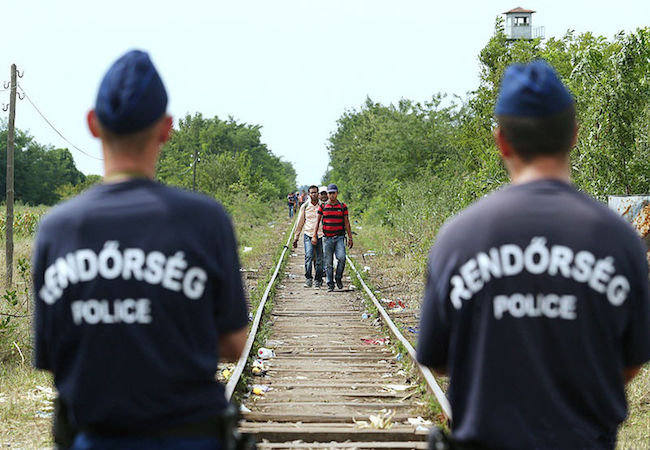
By Alireza Salehi Nejad
Issues including the immigration flows, increased diversity of the society, and alienation of parts of the population are not necessarily new phenomena for the European Union. As an illustration, Frontex, the EU Agency for the Management of Operational Cooperation at the External Borders, was founded in 2004 in the light of the uncontrolled immigration from Africa to control the cooperation between national border guards securing its external borders, or EUROSUR (the European Border Surveillance System) has come to effect since 2013.
International Organization for Migration (IOM) has estimated the arrival of over one million refugees and migrants in the European Union; over 800,000 of whom arrived by sea in Greece and a further 3,600 died or went missing. It is worth noting that approximately 90% of the asylum seekers over the past year have ended up in Germany, Sweden and Austria. As a result, Austria has suspended Schengen, and German officials stated that the migration crisis is the biggest issue the country has faced since the 1990 reunification.
However, the issue is not only about the asylum seekers from Africa or the Middle East war-zones. For instance, the UK seeks to curb immigration from the rest of the EU, particularly in case of Polish migration after the 2004 EU enlargement. Indeed, the EU/EEA immigration escalated from 10% of the UK net migration in the 1970s to 40% by 2007. The immigration issues were also addressed by David Cameron in his Bloomberg Speech on the EU given on 23 Jan 2013. Needless to say that the UKIP under Nigel Farage since 2006 and under Lord Pearson since 2009 opposed the uncontrolled immigration, and immigration has become the highlight of the UKIP’s manifesto since 2013. By the same token, immigration was one of the major debates for the UK 2015 General Election.
As a matter of fact, the majority of migrants in Europe are not refugees but are merely economic migrants seeking a better life. This distinction is important since under the UN-mandated Geneva 1951 Refugee Convention, after the destructive WWII that left millions of evacuees and deportees wandering across the war-torn Europe, and in correlation with the EU laws, European countries are required to offer refuge or other types of protection to those who are fleeing from a war-zone or persecution. Even though that the initial ratified right of asylum was limited to Europeans, this limitation was lifted in 1967 and is globally recognized.
Physical, fiscal and technical barriers were the three EU segmented borders prior to introducing the EU Single Market that tends to guarantee the ‘four freedoms’ of free movement of goods, capital, services, and people between the EU’s member states. As a result, the physical borders have been abolished and the Schengen Area came to effect by ratification of most EU member states and four EFTA members.
The current immigration crisis threatens the very foundations of the EU and risks reigniting tensions among European countries particularly those with historical bloodshed. The nationalists have different core perspectives on the immigration crisis, as some view the migrants as an external threat or even a Trojan Horse, some are concerned regarding unemployment and the economy, while others are concerned about the national values and culture. Within this context, populism is rising as widespread European political landscape with direct electoral gains and indirect influence on security and immigration policy. Populism is generally a multifaceted right-wing phenomenon and chiefly advocates for anti-establishment and anti-European integration. Populism can be distinguished as economic populism, anti-establishment populism, and identity populism.
Considering that the stereotype of the migrants are typically Muslim refugees from the Middle East and seeing the Islamic fundamentalists as violent extremists amid controversial events from the 9/11 attacks to the ISIS developments and the Cologne attacks has led to social-xenophobia and Islamophobia agendas among the right-wings. Interestingly while the far-right nationalist politicians are warnings about the threat to the native European Christendom, many churches and religious charities succor the migrants and campaign for a fair and decent European hospitality.
Nevertheless, it should be noted that whereas the escalating xenophobic and islamophobic sentiments generate a greater gap and alienation of parts of the population who share different ideologies and belief-systems that consequently leads to catastrophic dissolution of the society; however, understanding the newcomers circumstances and welcoming them to the community facilitates the adaptation to the new environment and makes the heterogeneity of the society members’ background united under national and humanistic values.
Earlier in mid-December, the European Commission with support of the European Council has proposed a new European Border and Coast Guard to replace Frontex. By the same token, the EC has called for permanent obligatory sharing of refugees across the EU which demands revision of the Dublin Regulation.
Nonetheless, it is important to realize that even an effective peace plan in the war-torn regions does not restore the damaged economic and social fabric of the region, which recovery will take decades. Hence, the EU policy makers should tighten immigration policies and be more selective to maintain the existence of the Union.




